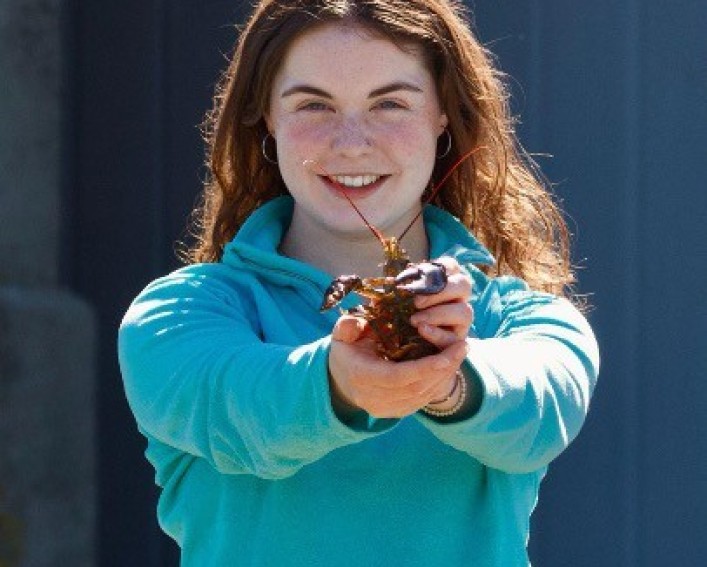Get started in research!
At Cornell, research in the biological sciences spans an incredible range—from the molecular to the global. Our scientists are tackling big questions in agriculture, food and nutrition, life sciences, environmental studies, and the social and behavioral sciences.
Whether it's uncovering how the brain works, understanding the balance of ecosystems, or decoding the molecular building blocks of life, our work is pushing the boundaries of knowledge.
Research happens everywhere: in state-of-the-art labs, climate-controlled greenhouses, bustling urban centers, and remote tropical rainforests. You’ll find our researchers mapping neural circuits, tracking biodiversity, analyzing gene expression, and studying how farmers feed the world.
No matter the setting, our mission is clear: to improve lives and promote sustainability—across New York State, the nation, and the world. Join in the quest for new knowledge and understanding!
Biological Sciences students who are part of the College of Agriculture and Life Sciences (CALS), click here for more information about types of research experiences, how to connect with faculty, and ways to fund your work.
Biological Sciences students who are part of the College of Arts and Sciences (A&S), click here for more information about the many resources available to you to find and fund your experience.
Looking for a research opportunity at Cornell?
- Scroll through the steps #1-4 listed below for an overview of how to get started.
- Schedule a Research Advising meeting

1. Reflect: What are you looking for in a research position?
- What skills and knowledge are you hoping to gain from a research experience?
- What field(s) would you like to study?
- Where can you do your work? Some labs are across campus or off campus; some research is done in the field, some can be done remotely.
- How much time and energy do you have to commit to research? Most labs require a minimum 6-hour commitment divided in 2-3 hour blocks.
2. Find opportunities
Most research opportunities are not advertised. Students find positions by contacting researchers they would like to work with – usually by email.
- Ask your professors, TAs, or faculty advisor for advice on finding research opportunities.
- Search the Cornell Researchers Box File for opportunities to conduct research with a scientist in your field of interest.
- Meet with a Student Advisor who will share their research experiences and offer insight.
- Search through the CALS Directory and the A&S Directory to narrow down your field of interest and selection of researchers.
- Participate in the Peer Mentoring Program through CURB (Cornell Undergraduate Research Board).
- Paid research opportunities may be found on the Student Employment website or by speaking with individual research mentors.
3. Contact potential research mentors
- Before contacting a researcher to serve as a potential mentor:
- Create a resume highlighting any past research experience, coursework taken to prepare you for research, and transferrable skills.
- Read the researcher’s website and read the abstract of one or more recent papers.
- Send an introductory email message expressing your interest in their research. Reference this checklist of characteristics of a good email message.
- Start with a professional greeting (Dear Dr. or Professor X).
- Introduce yourself with your name, class year and major.
- Explain why you are interested in their research – be specific! Generic emails do not get much attention.
- Share why you are a good fit for the lab by providing more information about yourself. Describe your experiences (non-research experiences are great!).
- Emails should be concise; limit yourself to one to three paragraphs.
- End with a question. Ask to meet to discuss their research or getting involved in their field.
- Would you like feedback on a draft message to faculty? Meet with an OUB student advisor.
4. Meet with potential research mentors
Congrats on getting a face to face meeting with a researcher! Now it’s time to prepare.
- Make sure you can articulate why you’re interested in their work specifically and research in general. Practice saying it out loud.
- Prepare a list of questions. These can be about research or the lab structure (e.g., what do undergrads do each day?). Only ask questions you’re sincerely curious about. Check out these example questions for mentors from NIH.
- You do not need to understand technical details of their research or have read several of their papers.
- Be prepared to talk about time commitment. Bring your schedule.
- Aim not only to find a lab, but the right lab for you. Fit matters! Meet with several mentors if you can; finding the right mentor matters as much or more than the specific research project you will work on.
Where do bio sci majors do research?
- College of Veterinary Medicine
- Department of Animal Science
- Department of Ecology and Evolution
- Department of Molecular Biology and Genetics
- Department of Natural Resources & the Environment
- Department of Neurobiology and Behavior
- Department of Psychology
- Division of Nutritional Sciences
- Lab of Ornithology
- School of Biomedical Engineering
- School of Integrative Plant Science
- Cornell Center for Comparative and Population Genomics
Researcher Highlights
Ondine Morgan-Knapp '26
About My Research:
My research aims to make the lobster fishery more sustainable by using fish processing byproducts to make an alternative lobster bait. The project is motivated by current ecologically and economically unsustainable bait sourcing practices connected with the overfishing of traditional baitfish stocks. I spent the past academic year developing a formula for a bait “cake” composed predominantly of ground haddock frames (i.e., the bones, heads, and tails left over from fileting), and this past summer, I designed and conducted lab and field tests to determine and quantify the success of the new, more sustainable, bait in attracting lobsters.
In addition to my work with the Won lab, I’m also doing research in the Rudstam lab on Great Lakes zooplankton ecology – especially focusing on cannibalistic feeding behavior in mysis shrimp and its effects on the rest of the Great Lakes ecosystem.
Plans After Graduation:
I plan to go to graduate school and continue doing marine biology research. Specifically, I’d like to focus on research that addresses problems relating to environmental issues as well as social and economic issues. I’m especially interested in marine invertebrates and their ecology and behavior!
My Advice to You!
Don’t underestimate the power of taking initiative, both in doing a project you’re already involved with and in trying to get involved with a new project. It’s a great skill to practice and can get you places you never thought you could go. My first research experience happened because I reached out to a professor and asked if there was anything I could do to help with his work, even though he wasn’t actively recruiting people to be part of his lab. He agreed – I started out by squatting in seaweed and measuring snails for hours every day (sometimes at the crack of dawn) and ended up working very closely with him on a few interesting projects about lobster behavior.
Hanqing Li '25
About My Research:
I am interested in yeast transcriptional regulation and interactions between transcription factors (TF). Our research applies ChIP-exo, a chromatin immunoprecipitation technique that enables high-resolution mapping of protein binding sites across the genome, to study CRISPR-Cas9 constructed dual-tagged yeast strains. By studying the ChIP profile of a TF with/without the depletion of another factor, we might examine the TF interactions in depth, therefore enhancing the understanding of yeasts’ gene regulatory network.
Plans After Graduation:
I am going to graduate school to pursue my PhD degree, and I will be applying for molecular biology and genetics programs. If I am admitted, ideally I might attend a lab where I can apply both my wet-bench and dry-bench techniques. It would be wonderful if I could carry out the whole data generation (pipetting) and analysis (programming) pipeline on my own.
Lea Seo '26
About My Research:
As of right now, I've been assisting in testing the different concentrations of a polymer used to make a biodegradable graft for the carotid. Up until now, I've been focusing on measuring the amount of protein released in a controlled release experiment, utilizing LipCo (lipocoacervate) as a protein transport carrier.
Plans After Graduation:
I plan to apply and attend medical school upon graduation.
My Advice to You!
I encourage students to ask several upperclassmen for what they did so far while here at Cornell and ask them for advice and help!





